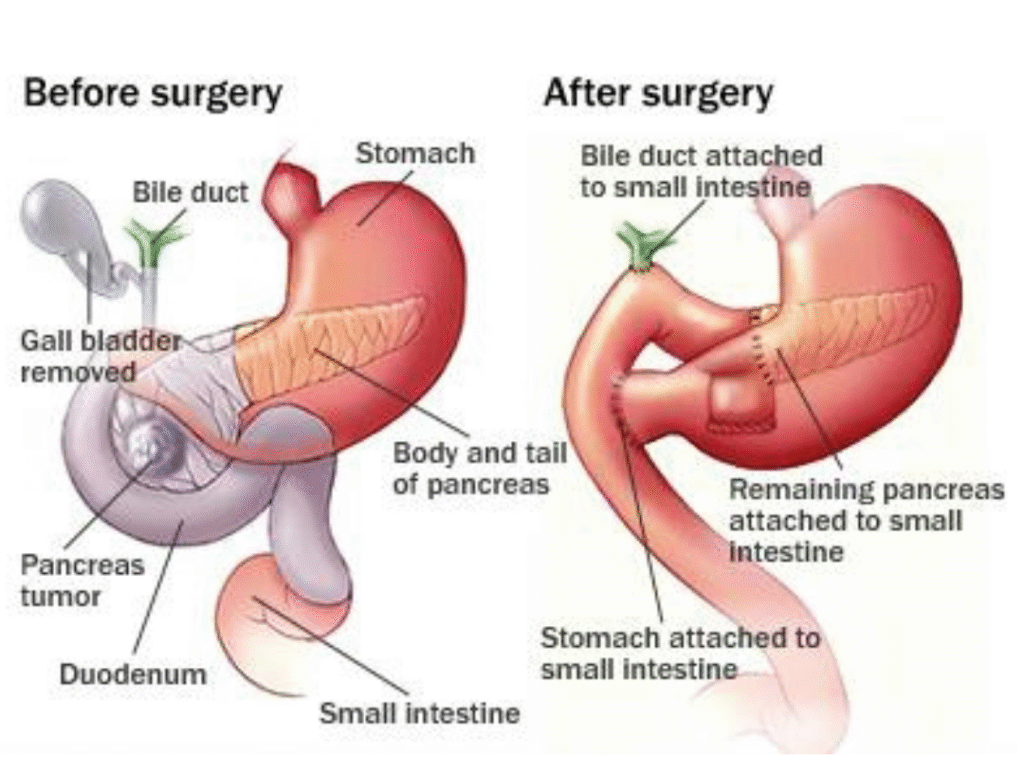
What is Laparoscopic Pancreatic Surgery?
Laparoscopic pancreatic surgery is a minimally invasive procedure used to treat conditions affecting the pancreas, including tumors, cysts, chronic pancreatitis, and pancreatic cancer. Instead of a large incision, this advanced technique utilizes small keyhole incisions, a high-definition camera (laparoscope), and specialized surgical instruments to perform precise pancreatic procedures with reduced pain, quicker recovery, and minimal scarring.
Patients suffering from pancreatic diseases can benefit significantly from this cutting-edge surgical approach, ensuring better outcomes and improved post-surgical quality of life.
Why Choose Laparoscopic Surgery for Pancreatic Conditions?
Traditional open pancreatic surgery involves a large abdominal incision, leading to a longer recovery period and higher risk of complications. Laparoscopic pancreatic surgery offers several advantages, such as:
✔ Smaller Incisions – Less scarring and better cosmetic results.
✔ Faster Recovery – Most patients heal quicker and return to normal activities sooner.
✔ Less Pain & Blood Loss – Minimally invasive techniques reduce postoperative pain and bleeding.
✔ Shorter Hospital Stay – Many patients can go home in a few days.
✔ Lower Risk of Complications – Reduced chances of infection, hernias, and other post-surgical issues.
✔ Enhanced Precision – Advanced laparoscopic visualization improves surgical accuracy and safety.
These benefits make laparoscopic pancreatic surgery a preferred choice for treating pancreatic disorders effectively and safely.
Conditions Treated with Laparoscopic Pancreatic Surgery
Laparoscopic surgery is used to treat a variety of pancreatic conditions, including:
1. Pancreatic Cancer
Early-stage pancreatic cancer can be treated with laparoscopic pancreaticoduodenectomy (Whipple procedure) or distal pancreatectomy, Radical Antegrade Modular Pancreatosplenectomy (RAMPS), allowing for precise tumor removal while preserving healthy tissue.
2. Pancreatic Cysts & Tumors
Benign and precancerous cysts or tumors in the pancreas can be removed using laparoscopic techniques, ensuring minimal impact on pancreatic function.
3. Chronic Pancreatitis
For patients with severe chronic pancreatitis, laparoscopic procedures, Frey’s procedure, Longitudinal pancreatico jejunostomy (LPJ), and the Puestow procedure can help relieve pain and remove damaged portions of the pancreas.
4. Pancreatic Neuroendocrine Tumors (PNETs)
These rare tumors can often be removed laparoscopically, reducing post-surgical complications and improving long-term outcomes.
5. Pancreatic Trauma & Injuries
Laparoscopic surgery can be used to repair pancreatic damage caused by trauma, preventing further complications.
6. Pancreatic Necrosectomy
Laparoscopic pancreatic necrosectomy is a specialized procedure used to remove infected or dead pancreatic tissue (necrosis) that may develop after acute or severe pancreatitis. This approach is less invasive than traditional open surgery, helping reduce the risk of complications and improving recovery outcomes.
Recovery After Laparoscopic Pancreatic Surgery
Hospital Stay & Immediate Post-Op Care
Most patients stay in the hospital for 3-7 days, depending on the complexity of the surgery. Recovery includes:
- Pain Management – Medications to ensure comfort.
- Dietary Progression – Gradual reintroduction of food.
- Early Mobilization – Walking to enhance circulation and prevent complications.
- Regular Follow-ups – To monitor healing and prevent recurrence.
Home Recovery Guidelines
Most patients resume daily activities within 2-4 weeks, but heavy lifting and strenuous exercise should be avoided for at least 6 weeks.
Is Laparoscopic Pancreatic Surgery Right for You?
Not all patients are candidates for laparoscopic pancreatic surgery. Factors such as tumor size, location, previous surgeries, and overall health determine whether a minimally invasive or open surgical approach is best. A thorough consultation with an experienced Laparoscopic GI Surgeon will help decide the best treatment option.
Why Choose Us for Laparoscopic Pancreatic Surgery?
Patients trust us for expert minimally invasive pancreatic surgery because we offer:
✔ Highly Experienced Laparoscopic Surgeons – Specializing in pancreatic procedures.
✔ State-of-the-Art Technology – Latest laparoscopic and robotic-assisted surgical techniques.
✔ Personalized Treatment Plans – Tailored approach for each patient’s condition.
✔ Comprehensive Pre & Post-Operative Care – Dedicated support for smooth recovery.
✔ Excellent Success Rates – Proven track record in pancreatic surgery.
We are committed to providing advanced, patient-centered care with minimally invasive techniques that ensure faster healing and better outcomes.
